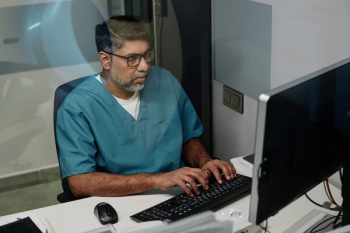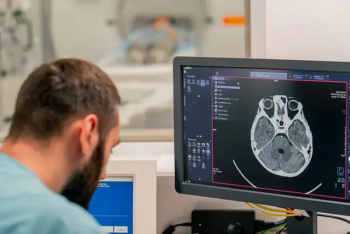
That Doesn’t Help
Reasonable expectations are far from universally gratified in radiology.
I’ve mentioned in one or two previous columns that I’m not good with my hands. That goes for anything from assembling an Ikea bookcase to performing medical procedures.
Of course, knowing this about myself didn’t translate into a permission slip for me to skip the required clinical rotations in interventional radiology during my training, so my fumbling digits were unfortunately inflicted upon the other, far more capable folks in that subsection of the department.
A typical moment during one of those rotations, when I failed to gracefully hand over whatever my attending had requested (it probably wound up on the floor), was punctuated by his understated retort: “That doesn’t help.”
It’s funny how certain moments get etched into the memory so enduringly. “That doesn’t help” has subsequently become a phrase that eagerly leaps to my mind, whether in response to some error I’ve committed or something less-than-assistive from someone who could otherwise be making my life easier.
It’s a simple enough statement, but the subtext is a bit more complex: The unhelpful individual could, and probably should, have done better. And, especially with the unhelpfulness having been verbally pointed out, it’s reasonably expected that s/he will show improvement the next time around.
Reasonable expectations, lest it need saying, are far from universally gratified. And thus, I not uncommonly find myself thinking, “That doesn’t help” any number of times in a typical radiological day:
• The clinical history, if I’ve gotten one at all, is noncontributory. Stuff like “R/O path” doesn’t help me. Nor does “pain” when you don’t bother telling me details like where the pain actually is. I would say I can safely assume it’s in the body part that got imaged-but I’ve encountered enough cases to know even that can be wrong. A particular peeve of mine is when the history says “follow up” but doesn’t say of what…and, of course, there are no prior studies.
• The study was done the wrong way. Whether the fault of the tech, or (usually) the referrer who ordered it and thinks he can protocol imaging without input from the silly ol’ rad. No, I will NOT “r/o PE” after you insisted that your patient’s chest CT be done without contrast. Nor will I be able to tell you anything meaningful about the patient’s carotid arteries when the mailed-in efforts at spectral analysis claim that this walking, talking outpatient has peak-systolic velocities in the 20s.
• There are prior studies and/or reports, but you didn’t mention them, let alone send them my way. Couple that with a nonexistent clinical history, and now I get to think I’m the first one diagnosing this patient’s metastatic cancer. I’ll dutifully measure everything and probably take thrice as long to read the case as I would for one of the “r/o appy” studies on my worklist because, hey, that’s my job. Then, when the priors actually turn up, I’ll have to essentially reread the entire thing and make a massive addendum to my report. My only satisfaction in the process might be when, thinking I’ve diagnosed a new, unexpected malignancy, my “critical results” phone call unnecessarily wakes you up at 2 A.M.
• Speaking of phone calls, it really doesn’t help when I’ve got a referrer who asks that imaging-results be personally called to him, however normal they may be-but he can never be gotten on the horn. It’s bad enough that some docs (or their on-call stand-ins) are chronically unreachable when the studies they’ve ordered are rip-roaring abnormal and I’d be calling them up of my own accord.
• Then there are the calls for help from my own rad-brethren, who are looking for another set of eyes and brain-cells as a consult for a case they’re finding challenging. Great, happy to help-especially if I’m liable to be asking them for similar assistance down the road. Except for when the consult-question actually turns out to be, “Please review this entire case and tell me what to say in my report.” (That’s usually when I offer to take ownership of the exam and read it myself.)
Newsletter
Stay at the forefront of radiology with the Diagnostic Imaging newsletter, delivering the latest news, clinical insights, and imaging advancements for today’s radiologists.












